直接引语变间接引语(超级经典归纳)
(详细版)直接引语变间接引语

4.直接引语是祈使句
间接引语应改为 “Tell (ask, order, beg等) sb (not) to do sth.”句型 。
"Don't make any noise," the teacher said to the studen →She told (ordered) the students not to make any noise. “Open the door, please," said she. →She asked him to open the door. The teacher said to the students, “Stop talking.” →The teacher told the students to stop talking. “Don’t touch anything.” He said. →He told us not to touch anything.
指示代词this, Nhomakorabeathese
时 间 状 语
now, today this week yesterday last week four days ago the day before yesterday tomorrow next month
The day after tomorrow
地点状语
方向性动词
直接引语变间接引语面面观
一、如何变人称: 口诀:一随主。二随宾,第三人称不更新。 “一随主”是指在直接引语变间接引语时,如果从句中的主语 是第一人称或被第一人称所修饰。从句中的人称要按照主句中 主语的人称变化如: She said. "My brother wants to go shopping with me. ” →She said her brother wanted to go shopping with her. “二随宾”是指直接引语变间接引语时,若从句中的主语及宾语 是第二人称或被第二人称所修饰。从句中的人称要跟引号外的主 句的宾语一致。如果引号外的主句没有宾语。也可以用第一人称 ,如:
直接引语改为间接引语(附答案)
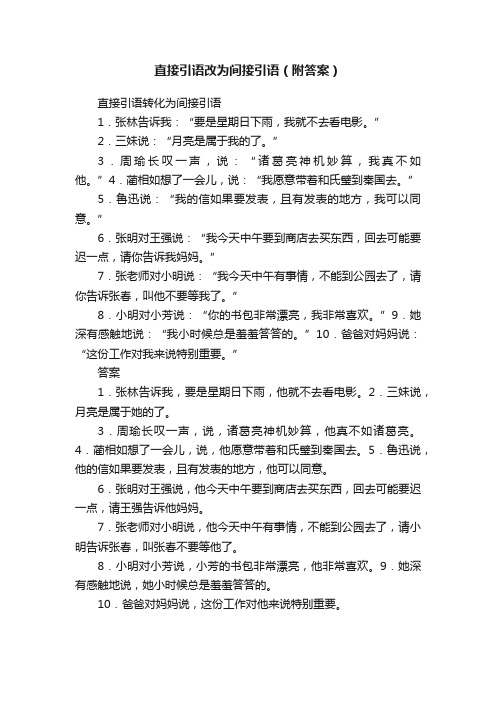
直接引语改为间接引语(附答案)
直接引语转化为间接引语
1.张林告诉我:“要是星期日下雨,我就不去看电影。
”
2.三妹说:“月亮是属于我的了。
”
3.周瑜长叹一声,说:“诸葛亮神机妙算,我真不如他。
”4.蔺相如想了一会儿,说:“我愿意带着和氏璧到秦国去。
”
5.鲁迅说:“我的信如果要发表,且有发表的地方,我可以同意。
”
6.张明对王强说:“我今天中午要到商店去买东西,回去可能要迟一点,请你告诉我妈妈。
”
7.张老师对小明说:“我今天中午有事情,不能到公园去了,请你告诉张春,叫他不要等我了。
”
8.小明对小芳说:“你的书包非常漂亮,我非常喜欢。
”9.她深有感触地说:“我小时候总是羞羞答答的。
”10.爸爸对妈妈说:“这份工作对我来说特别重要。
”
答案
1.张林告诉我,要是星期日下雨,他就不去看电影。
2.三妹说,月亮是属于她的了。
3.周瑜长叹一声,说,诸葛亮神机妙算,他真不如诸葛亮。
4.蔺相如想了一会儿,说,他愿意带着和氏璧到秦国去。
5.鲁迅说,他的信如果要发表,且有发表的地方,他可以同意。
6.张明对王强说,他今天中午要到商店去买东西,回去可能要迟一点,请王强告诉他妈妈。
7.张老师对小明说,他今天中午有事情,不能到公园去了,请小明告诉张春,叫张春不要等他了。
8.小明对小芳说,小芳的书包非常漂亮,他非常喜欢。
9.她深有感触地说,她小时候总是羞羞答答的。
10.爸爸对妈妈说,这份工作对他来说特别重要。
直接引语变间接引语 (整理版)

语法讲解直接引语变间接引语引述别人的话有两种方式:一是使用引号引出人家的原话,这叫做直接引语;一是用自己的话把人家的话转述出来,这叫做间接引语。
例如:John said, "I‟m going to London with my father."约翰说:"我要和父亲到伦敦去。
"(引号内是直接引语)John said that he was going to London with his father.约翰说,他要和他父亲去伦敦。
(宾语从句是间接引语)一、如何变人称:有一句顺口溜“一随主.二随宾,第三人称不更新”.如:1.“一随主”She said. "My brother wants to go with me. "→She said her brother wanted to go with her.如果从句中的主语( I 或My…)是第一人称或被第一人称所修饰.从句中的人称要按照主句中主语(she)的人称变化2.“二随宾”如:He said to Kate. "How is your s ister now?"→He asked Kate how her sister was then.若从句中的主语及宾语是第二人称.或被第二人你所修饰.从句中的人称要跟引号外的主句的宾语一致.如果引号外的主句没有宾语.也可以用第一人称,3.“第三人称不更新”如:Mr Smith said. "Jack is a good worker."→Mr Smith said Jack was a good worker.如果从句中的主语及宾语是第三人称或被第三人称所修饰从句中的人称一般不需要变化二、如何变时态:直接引语在改为间接引语时、时态需要做相应的调整.现在时态需改为过去时态;过去时态改为完成时;过去完成时则保留原来的时态.如:1)She said. "I have lost a pen."→She said she had lost a pen2)She said. "We hope so."→She said they hoped so.(1)一般现在时变为一般过去时(2)现在进行时变为过去进行时(3)一般将来时变为过去将来时(4)现在完成时变为过去完成时(5)一般过去时变为过去完成时(6)过去完成时不变,仍为过去完成时但要注意在以下几种情况下.在直接引语变为间接引语时,时态一般不变化.①直接引语是客观真理."The earth moves around the sun and the moon moves around the earth, the teacher told me. → The teacher told me the earth moves around the sun and the moon moves around the earth.②直接引语是过去进行时,时态不变.如:Jack said. "John, where were you going when I met you in the street?"→Jack asked John where he was going when he met him in the street.③直接引语中有具体的过去某年、某月、某日作状语,变为间接引语时,时态不变.如:Xiao Wang said. "I was born on April 2l, 1980." →Xiao Wang said he was born on April 20, 1980.④直接引语如果是一般现在时.表示一种反复出现或习惯性的动作,变间接引语,时态不变.如:He said, "I get up at six every morning." →He said he gets up at six every morning.⑤如果直接引语中的情态动词没有过去时的形式(例:ought to(应该), had better(最好), used to(过去常常))和已经是过去时的形式时,(例:could, should, would, might)不再变.如:Peter said. "You had better come here today." →Peter said I had better go there that day.三、如何变状语:直接引语变间接引语,状语变化有其内在规津,时间状语由“现在”改为“原来”(例:now变为then,yesterday.变为the day before)地点状语,尤其表示方向性的,或用指示代词修饰的状语,由“此”改为“彼”(例:this 改为that),如:四、如何变句型:①直接引语如果是陈述句,间接引语应改为由that引导的宾语从句.如:S he said, "Our bus will arrive in five minutes."→She said that their bus would arrive in five minutes.②直接引语如果是反意疑问句,选择疑问句或一般疑问句,间接引语应改为由whether或if(是否)引导的宾语从句.如:He said, "Can you swim, John?" →He asked John if he could swim."You have finished the homework, haven‟t you?" my mother asked. →My mother asked me whether I had finished the homework or not ."Do you go to school by bus or by bike?" →He asked me if I went to school by bus or by bike.③直接引语如果是特殊问句,间接引语应该改为由疑问代词或疑问副词引导的宾语从句(宾语从句必须用陈述句语序).She asked me, "When do they have their dinner?"→ She asked me when they had their dinner.④直接引语如果是祈使句,间接引语应改为"tell(ask, order, beg等) sb (not) to do sth."句型.如:"Don‟t make any noise," she said to the children. →She told (ordered) the children not to make any noise."Bring me a cup of tea, please," said she.→She asked him to take her a cup of tea.⑤直接引语如果是以“Let…s”开头的祈使句,变为间接引语时,通常用“suggest(建议)+动名词(或从句).”如:He said, "Let‟s go to the film." →He suggested going to the film.或He suggested that they should go to see the film.。
直接引语变间接引语完整

8、老师严厉地对小敏说:“您必须把 教室打扫干净。”
9、老师对王小宁说:“我有事,您组 织同学们继续完成制作。”
10、王明再也忍不住了,抢着对老班长 说:“我帮您一起找,我找得见。”
8、老师严厉地对小敏说,她必须把教室打扫干净。
9、老师对王小宁说,她有事,王小宁组织同学们继续完 成制作。
(转述句)
引述句改为转述句得方法:
1、引述句改为转述句,冒号改为逗号,去掉双引 号。
2、引述句改为转述句时,把第一人称“我”要改 为第三人称“她” 或“她”。
3、把第二人称“您”改为第一人称“我” 。
1、妈妈对我说:“今天我要开会,您自己做饭吃。” 2、张老师对小明说:“这件事情,您冤枉了小红。”
大家有疑问的,可以询问和交流
可以互相讨论下,但要小声点
1、妈妈对我说,今天她要开会,我自己做饭吃。 2、张老师对小明说,这件事情小明冤枉了小红。
3、鲁肃对我说:“都就是您自己找得,我怎么帮得了 您得忙?”
4、妈妈对小宁说:“昨天,您到哪里去了?我找了您 一整天。”
3、鲁肃对我说,都就是我自己找得,她怎么帮得了我得忙。 4、妈妈对小宁说,昨天小宁到哪里去了,她找了她一整天。
10、李明再也忍不住了,抢着对老班长说,她我帮老班长 一起找,她找得见。
二、间接叙述转换为直接叙述
(1)改标点,改逗号为冒号,添加引号。 (2)改人称如果转述内容中就是第三人称“她(她)” 或“她(她)们”,应改为“我”或 我(们)”;如 果在转换时遇到一个句子中有两个第一人称“我” 时,应改后面得一个“我”为第二人称“您”。
例:姐姐说,她明天送给我一件生日礼物。 改为:姐姐说:“我明天送给您一件生日礼物。
(完整版)直接引语改为间接引语

(完整版)直接引语改为间接引语直接引语改为间接引语基本方法及例句基本方法1、改标点①把“冒号”改成“逗号”②去掉“双引号”2、改人称(一般情况下)③把“我”改成“他”/“她”把“我们”改成“他们”/“她们”④把“他”/“她”改成“我”把“他们”/“她们”改成“我们”⑤把“你”改成“我”/“他”/“她”⑥把“你们”改成“我们”/“他们”/“她们”(根据说话的对象决定)3、检查句子,添加/减少/修改一两个词语,使句子意思通顺,表达合理举例说明这些句子分成三类:①××对我说……1、直接引语是直接引用别人的话,而间接引语则是转达别人说的话,因此,直接引语改为间接引语时,说话人即第一人称“我”要改为第三人称“他”或“她”。
如:张童对我说:“我一定要坚持长跑锻炼。
”改:张童告诉我,他一定要坚持长跑锻炼。
2、当转述内容涉及其他人称时的改法。
如:姐姐对我说:“你说得对,我就这样做。
”改:姐姐告诉我,我说得对,她就这样做。
上面的例句中涉及了第二人称,在改为转述句时就应改为第一人称。
还应注意,冒号和引号前的内容不变。
②我对××说……如:我对小王说:“你的成绩总是名列前茅,我要向你学习。
”改:我对小王说,他的成绩总是名列前茅,我要向他学习。
③××对××说……如:妈妈对爸爸说:“我明天要去开会。
”改:妈妈对爸爸说,她明天要去开会。
妈妈告诉爸爸,她明天要去开会。
直接引语和间接引语句子训练文章摘要:本文章的主要内容是关于直接引语和间接引语句子训练,欢迎您来阅读并提出宝贵意见!直接引语和间接引语(转述句和陈述句)1.直接引语是直接引用别人的话,而间接引语则是转达别人说的话,因此,直接引语改为间接引语时,说话人即第一人称“我”要改为第三人称“他”或“她”。
如:张童对我说:“我一定要坚持长跑锻炼。
”改:张童告诉我,他一定要坚持长跑锻炼。
2.当转述内容涉及其他人称时的改法。
直接引语变间接引语口诀五则

••直接引语变间接引语口诀五则1.变陈述句,去掉引号加that, 时态全向后退过;人称变化看主语,其它变化背表格。
2.变一般疑问句,去掉引号请“if”,陈述语序要记住;时态人称后状语,全都要变别马虎。
3.变特殊疑问句,直接引语去引号,原句问词作引导;陈述语序助去掉,其它变化别漏掉。
4.变祈使句,动前加to去引导,tell, ask句型套;否认祈使一样变, not就往to前靠。
5.直转间人称变,一主二宾三不变。
【特别提示】“一主”是指直接引语为第一人称变间接引语时,须与主句的主语在人称和数上坚持一致;“二宾”是指直接引语是第二人称变间接引语后需与主句的宾语在人称上一致;“三不变”是指直接引语中的代词若是第三人称,变为间接引语时则不变.直接引语变为间接引语时,若主句为过去时态,变为间接引语的宾语从句通常要将时态往后推一个,即。
如:一般现在时变为一般过去时,一般将来时变为过去将来时,现在进行时变为过去进行时,现在完成时变为过去完成时,一般过去时也变为过去完成时,等等(若直接引语为过去完成时,变为间接引语可以不变)。
另外,若直接引语中有情态动词can, may等,也应变成过去式could, might等(情态动词must可以变为had to,也可不变,should, ought to, had better 等可以不变)。
如:“I want to stay here.”he said. 他说。
如:“我想留在这儿。
”→He said that he wanted to stay there. 他说他想留在那儿。
She said, “It’s raining very hard.”他说。
如:“雨下得很大。
”→He said that it was raining very hard. 他说雨下得很大。
Jim said, “I can speak Chinese.”吉姆说。
如:“我会讲汉语。
”→Jim said that he could speak Chinese. 吉姆说他会讲汉语注意:(1) 若直接引语为客观真理,则变为间接引语时时态不变。
直接引语变间接引语 详细讲解

考点直接引语和间接引语直接引用别人的话叫直接引语,用自己的话转述别人的话叫间接引语。
直接引语前后加引号;间接引语不必加引号。
间接引语有以下三种情况构成宾语从句,有两种情况变成不定式形式。
1.直接引语是陈述句时,变成间接引语就用宾语从句形式。
如:He said, “ I’m a student.”他说:“我是一名学生。
”❼He said he was a student.他说他是一名学生。
2.直接引语是一般疑问句时,变成间接引语形成if或whether引导的宾语从句。
如:He asked us,” Have you finished reading this book?”他问我们:“你们读完这本书了吗?”❼He asked us if/ whether we had finished reading that book.他问我们是否我们已经读完了这本书。
3.直接引语是特殊疑问句时,变成间接引语形成宾语从句。
如:The teacher asked,“Where are you going next week?”老师问:“下周你们要去哪儿?”❼The teacher asked where we were going the next week. 老师问第二周我们要去哪。
注意:当直接引语为特殊疑问句变间接引语形成宾语从句时,首先要注意用特殊疑问词,其后用正常语序的句子,同时注意人称、时态、时间状语的变化。
a.4.直接引语是肯定的祈使句时,变成间接引语时要用不定式形式。
如:①.Our parents told us“Learn English well!”我们的父母告诉我们:“把英语学好啊!”❼Our parents told us to learn English well. 我们的父母告诉我吗要把英语学好。
②.The teacher ordered them, “ Do that again.”老师命令他们说:“重做!”❼ The teacher ordered them to do that again.老师命令他们要重做。
直接引语变间接引语例句

直接引语变间接引语例句
1. 直接引语:他说:“我今天很忙,不能去参加聚会。
”
间接引语:他说他今天很忙,不能去参加聚会。
2. 直接引语:她问:“你昨天看了那场电影吗?”
间接引语:她问他昨天是否看了那场电影。
3. 直接引语:他对我说:“我喜欢你,愿意和你在一起。
”
间接引语:他告诉我他喜欢我,愿意和我在一起。
4. 直接引语:老师说:“明天的考试会很难,请大家好好复习。
”间接引语:老师告诉我们明天的考试会很难,请大家好好复习。
5. 直接引语:他告诉我:“我已经完成了这个任务。
”
间接引语:他告诉我他已经完成了这个任务。
6. 直接引语:她说:“我不知道答案,请帮帮我。
”
间接引语:她说她不知道答案,请帮帮她。
7. 直接引语:他对我说:“我非常感谢你的帮助。
”
间接引语:他对我表示非常感谢我的帮助。
8. 直接引语:他说:“我想请你帮我一个忙。
”
间接引语:他说他想请我帮他一个忙。
9. 直接引语:她告诉我:“我会把这个消息告诉你的。
”
间接引语:她告诉我她会把这个消息告诉我。
10. 直接引语:他说:“我不知道明天天气怎么样。
”间接引语:他说他不知道明天天气怎么样。
直接引语变为间接引语
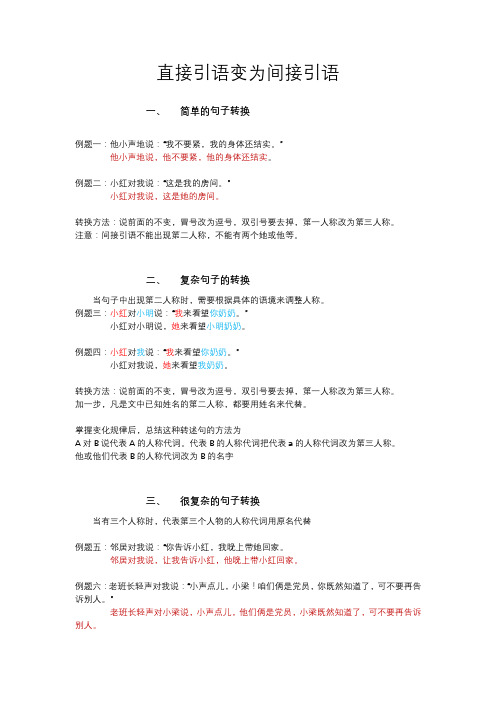
直接引语变为间接引语一、简单的句子转换例题一:他小声地说:“我不要紧,我的身体还结实。
”他小声地说,他不要紧,他的身体还结实。
例题二:小红对我说:“这是我的房间。
”小红对我说,这是她的房间。
转换方法:说前面的不变,冒号改为逗号,双引号要去掉,第一人称改为第三人称。
注意:间接引语不能出现第二人称,不能有两个她或他等。
二、复杂句子的转换当句子中出现第二人称时,需要根据具体的语境来调整人称。
例题三:小红对小明说:“我来看望你奶奶。
”小红对小明说,她来看望小明奶奶。
例题四:小红对我说:“我来看望你奶奶。
”小红对我说,她来看望我奶奶。
转换方法:说前面的不变,冒号改为逗号,双引号要去掉,第一人称改为第三人称。
加一步,凡是文中已知姓名的第二人称,都要用姓名来代替。
掌握变化规律后,总结这种转述句的方法为A对B说代表A的人称代词。
代表B的人称代词把代表a的人称代词改为第三人称。
他或他们代表B的人称代词改为B的名字三、很复杂的句子转换当有三个人称时,代表第三个人物的人称代词用原名代替例题五:邻居对我说:“你告诉小红,我晚上带她回家。
邻居对我说,让我告诉小红,他晚上带小红回家。
例题六:老班长轻声对我说:“小声点儿,小梁!咱们俩是党员,你既然知道了,可不要再告诉别人。
”老班长轻声对小梁说,小声点儿,他们俩是党员,小梁既然知道了,可不要再告诉别人。
注意:第三个人称代词的变化,以及需要适当增加或是删减个别词语,让句子更加通顺。
四、改变语气例题七:老师对孩子们说:“我可以和你们一起玩吗?“老师问孩子们,他可不可以和孩子们一起玩。
五、当堂练习1、爸爸对小红说:“今天放学,我接你去吃肯德基。
“爸爸对小红说,今天放学,他接小红去吃肯德基。
2、爸爸说:“你先和妈妈吃饭,我有事先走了。
“爸爸说,我和妈妈吃饭,他有事先走了。
3、老师对小红说:“我有事,你帮我管好纪律。
老师对小红说,他有事,让小红帮他管好纪律。
4、鲁肃对我说:“都是你自找的,我怎么帮得了你的忙。
直接引语变间接引语(详细篇)

Homework
homework.doc
变间接引语时,用that引导, (that在口语中常被省略)
注:间接引语的人称、时态、
指示代词、时间状语、地点状 语等都要做相应的变化。
1、人称的变化(从句主语的变化) (1)一随主: she said “I am 15.” --she said (that) she was 15.
口诀:一随主,二随宾,三不变。
指示代词
时 间 状 语
this,
these
now, today this week yesterday last week four days ago the day before yesterday tomorrow next month
地点状语 方向性动词 情态动词
here come, bring can, may, must
直接引语变间接引语
I am the king of the whole world.
What does the lion say?
一、定义
直接引语:直接引述别人的话,有引号。
间接引语:用自己的话转述别人的话,没
有引号。大多数情况下构成宾 语从句。
二、陈述句的转述
直接引语如果是一个陈述句,
4、直接引语是祈使句,
间接引语应改为“tell (ask,order,beg等) sb. to do sth.”的句型
4.祈使句
Little boy, put on your coat.
(They ordered )
Little boy, put on your coat.
They ordered Little boy put on your coat. to put his
直接引语变间接引语口诀

直接引语变间接引语口诀一、当直接引语为陈述句,变成间接引语的“顺口溜”是:去掉引号加that,人称变化要灵活,时态向后退一步,状语变化按规则。
She said,“My brother doesn't want to go there.”→She said that her brother didn't want to go there.二、当直接引语为一般疑问句,变成间接引语的“顺口溜”是:去掉引号加if,陈述语序要记住,时态人称和状语,小心变化别马虎。
I asked her,“Do you study English here?”→I asked her if she studied English there.三、当直接引语是特殊疑问句,变成间接引语的“顺口溜”是:直接去引号,陈述莫忘掉,小心助动词,丢它最重要。
“What do you want?”he asked me. →He asked me what I wanted.四、当直接引语是祈使句,变成间接引语的“顺口溜”是:去掉引号要加to, ask,tell须记住,直引若是否定式,not加在to前部。
The teacher said to her mother,“Please give me the book.” →The teacher told her mother to give her the book.五、对于人称变化,要求学生们记住的“顺口溜”是:第一人称看主语,第二人称看宾语,宾语若是不存在,活用代词I,my,me。
He said to her,“Are you interested in English?”→He a sked her if she was interested in English.The teacher said,“Where have you been?”→The teacher asked me(us) where I(we) had been.六、时态对应表:直接引语时态间接引语时态一般现在时→ 一般过去时一般将来时→ 过去将来时现在进行时→ 过去进行时一般过去时→ 过去完成时现在完成时→ 过去完成时(过去完成时时态不变)情态动词也要变成相应的过去式:can could; may might; must must/had to一般疑问句whether/if 引导的宾语从句“Is this your umbrella, Mary?” asked John.John asked Mary if that was her umbrella.特殊疑问句wh-词引导的宾语从句“Mary, when will you return John asked Mary when she wouldme the book?” asked John return him the book主句动词为一般现在时或现在完成时从句动词时态不变She often says, “All men and women She often says that all men and womenar e equal under the law.”are equal under the law.主句动词为一般过去时一般现在时一般过去时“I know it,” he said.He said that he knew it现在进行时过去进行时“I’m making coffee for you all,” she said.She said she was making coffee for us all.现在完成时过去完成时“I have seen her before,” said he. He said he had seen her before.一般过去时过去完成时“I saw her last Monday,” he said.He said he had seen her the previous Monday过去完成时过去完成时“ Do you know Rick had been ill in bed.Jack asked if I knew Rick had been ill in bedfor many days till he died?” Jack asked for many days till he died一般将来时过去将来时He said: “We shall start tomorrow He said they would start the next day由直接引语转变为间接引语,下列情况时态不变:1. 不变的真理The teacher said to the students, “Water freezes when the temperature falls below 0℃.”→ The teacher told the students that water freezes when the temperature falls below 0℃.2. 经常的习惯:He said to the doctor, “I smoke two packs every day.”→ He told the doctor that he smokes two packs every day.3. 历史事件:The teacher said, “World War Ⅱended in 1945.”→ The teacher said that World War Ⅱ ended in 1945.4. 部分情态动词,如must, ought to, used to, had better等:She said to me: “You must hurry up.”→ She said that I must hurry up.练习题;1. Jack said to me, “You look worried today.”Jack told me that ___ worried ___.A. he looks…todayB. you look…todayC. we looked…that dayD. I looked…that day2. We said to her, “They’re walking through the street now.”We told her that ___ through the street ___.A. we were walking…thenB. you are walking…nowC .they were walking…then D. they walking…now3. Mr Black said, “I have walked a long way this week.”Mr Black said that __ a long way __.A. I had walked…last wee kB. he had walked…that weekC. I walked…last weekD. he has walked…this week4. The man thought, “I shall take it back tomorrow.”The man thought that __ take it back ____.A. I shall…tomorrowB. I shall…the next dayC. he should…tomo rrowD. he wo uld …the next day5. They said to us, “Are you afraid to leave this house ?”They asked us ____ afraid to leave _____ house.A. that were we…thisB. that we were…thatC. if were we …thisD. if we were…that6. Jane said, “What did he hear about a week ago?”Jane asked ____ about _____.A. that he heard…a week ag oB. what he had heard…the week beforeC. what he had herd… a week agoD. if he heard…the week ago7. She asked, “Whose house will he break into next time ?”She asked whose house ____ break into __A. will he…next timeB. would he…the next timeC. he would…the next timeD. he will…next time8. Jack said to her, “Where do you spend your holidays?”Jack asked her where ____ holidays.A. she spent herB. you spend yourC. she spend herD. you spent your9. Black asked me, “ Why haven’t you left here yet?”Black asked me why ____ yet.A. I hadn’t left thereB. I haven’t left hereC. hadn’t I left thereD. haven’t I lef t here10. The teacher asked her, “Does the sun rise in the east ?”The teacher asked her ___ the sun ___ in the east.A. if…riseB. if…risesC. whether…roseD. whether did …rise。
直接引语变间接引语常用地三种情况

直接引语变间接引语常用的三种情况1、陈述句变成间接引语(1)“I am a teacher" she said.She said that she was a teacher.“You don't tell her my telephone number" he said.He said (that) I didn't tell her his telephone number.要注意时态的变化一般现在时变成一般过去时。
一般过去时变成过去完成时,现在完成时变成过去完成时,一般将来时变成过去将来时,this 变成that these变成those, here 变成there ,today变成that day, yesterday 变成the day before, tomorrow 变成next day, the day after tomorrow变成in two days' time,now 变成then等等。
2、将一般疑问句变成间接引语在这样的句子中要加“if" “是否”的意思。
(1)"Are you a student?"She asked me if I was a student.她问我是否是一位学生。
将原来的疑问句放在if 后面,但语顺变成肯定式的语顺。
另外还可以用whether 来表示。
She asked me whether I was a student.(2) "Did you finish your work yesterday?"He asked me if I have finished my work the day before.3.将特殊疑问句变成间接引语"What time is it?"He asked me what time it was."When will you go to town?"He asked me when would I go to town.在这样的句子里除疑问词放在间接引语的前面外,后面也是陈述句的语序。
直接引语变间接引语口诀
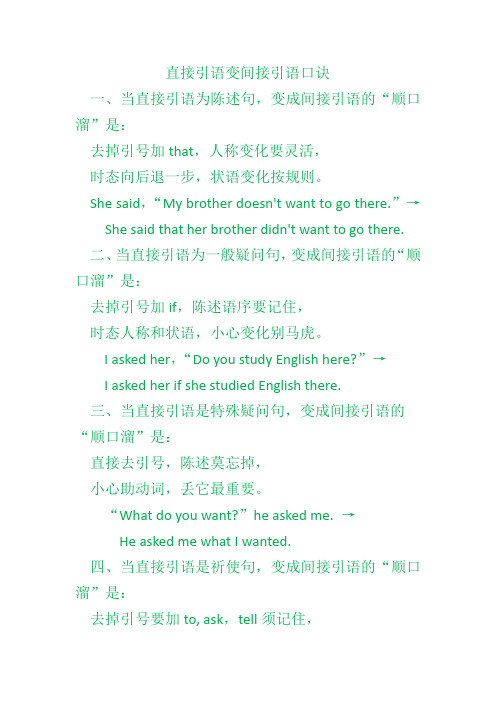
直接引语变间接引语口诀一、当直接引语为陈述句,变成间接引语的“顺口溜”是:去掉引号加that,人称变化要灵活,时态向后退一步,状语变化按规则。
She said,“My brother doesn't want to go there.”→She said that her brother didn't want to go there.二、当直接引语为一般疑问句,变成间接引语的“顺口溜”是:去掉引号加if,陈述语序要记住,时态人称和状语,小心变化别马虎。
I asked her,“Do you study English here?”→I asked her if she studied English there.三、当直接引语是特殊疑问句,变成间接引语的“顺口溜”是:直接去引号,陈述莫忘掉,小心助动词,丢它最重要。
“What do you want?”he asked me. →He asked me what I wanted.四、当直接引语是祈使句,变成间接引语的“顺口溜”是:去掉引号要加to, ask,tell须记住,直引若是否定式,not加在to前部。
The teacher said to her mother,“Please give me the book.”→The teacher told her mother to give her the book.五、对于人称变化,要求学生们记住的“顺口溜”是:第一人称看主语,第二人称看宾语,宾语若是不存有,活用代词I,my,me。
He said to her,“Are you interested in English?”→He asked her if she was interested in English.The teacher said,“Where have you been?”→The teacher asked me(us) where I(we)had been.六、时态对应表:直接引语时态间接引语时态一般现在时→一般过去时一般将来时→过去将来时现在实行时→过去实行时一般过去时→过去完成时现在完成时→过去完成时(过去完成时时态不变)情态动词也要变成相对应的过去式:can could; may might; must must/had to“直”变“间”何时时态无需变直接引语变为间接引语时,通常间接引语中谓语动词的时态是受主句中谓语动词时态约束的,主句的动词如果是过去时,间接引语中的动词也必须以某种过去时态出现。
直接引语变间接引语(带练习和答案)

直接引语和间接引语直接引语就是直接引用别人的话。
间接引语就是用自己的话转述别人的话。
间接引语多为宾语从句。
1. 直接引语变间接引语的方法(1) 直接引语如果是陈述句,间接引语应改为由that引导的宾语从句。
(that可省略)She said, “Our bus will arrive in five minutes.”→She said (that) their bus would arrive in five minutes.(2) 直接引语如果是反意疑问句,选择疑问句或一般疑问句,间接引语应改为由whether或if引导的宾语从句。
(宾语从句必须用陈述句语序)He said, “Can you swim, John?”→He asked John if he could swim.“You have finished the homework, haven’t you?” my mother asked.→My mother asked me whether I had finished the homework.He asked, “Do you go to school by bus or by bike?”→He asked me if I went to school by bus or by bike.She says,“Is Tom an Englishman?”→She asks whether/if Tom is an Englishman.注:主句引述动词是say时,要改为ask或wonder等。
(3) 直接引语如果是特殊疑问句,间接引语应该改为由原来的疑问词引导的宾语从句。
(宾语从句必须用陈述句语序)She asked me, “When do they have their dinner?”→She asked me when they had their dinner.(4) 直接引语如果是祈使句,间接引语应改为“tell/ask/order sb.(not) to do sth.”句型。
直接引语变间接引语(超级经典归纳)
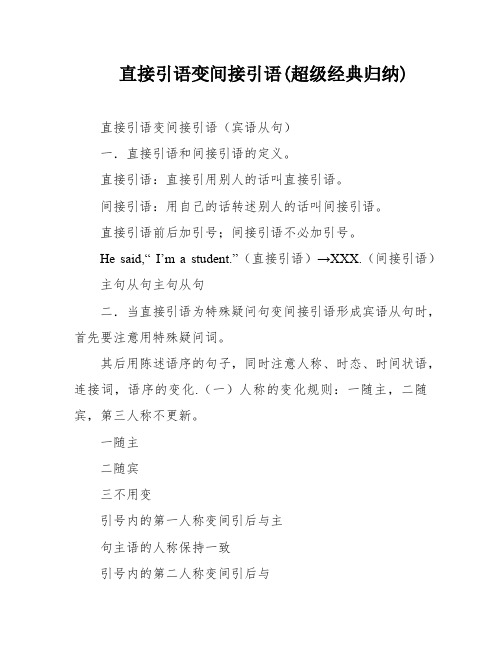
直接引语变间接引语(超级经典归纳)直接引语变间接引语(宾语从句)一.直接引语和间接引语的定义。
直接引语:直接引用别人的话叫直接引语。
间接引语:用自己的话转述别人的话叫间接引语。
直接引语前后加引号;间接引语不必加引号。
He said,“ I’m a student.”(直接引语)→XXX.(间接引语)主句从句主句从句二.当直接引语为特殊疑问句变间接引语形成宾语从句时,首先要注意用特殊疑问词。
其后用陈述语序的句子,同时注意人称、时态、时间状语,连接词,语序的变化.(一)人称的变化规则:一随主,二随宾,第三人称不更新。
一随主二随宾三不用变引号内的第一人称变间引后与主句主语的人称保持一致引号内的第二人称变间引后与主句宾语的人称保持一致引号内的第三人称在变间引后去人称稳定He says,”Ilike math very much。
→XXX。
He said to Lily,“you must get。
up early”→He told Lily that。
she must get up。
earlyShe said to me。
“They want to help him”→She told me that。
they wanted。
help him★(二).时态变化宾语从句时态变化规则:主现从不限;主过从四过(即4种过去的时态:一般过去时;过去进行时;过去将来时;过去完成时);客观真理,只用一般现在时。
1.主句普通目前时,从句可用随便时态。
2.主句曩昔时,从句用响应的曩昔时态。
即普通目前时改成普通曩昔时;目前举行时改成曩昔举行时;普通未来时改成曩昔未来时;普通曩昔时、目前完成时、曩昔完成时改成曩昔完成时。
3.主句过去时,从句是客观真理时,只用一般现在时。
XXX us:" XXX."XXX.主句的时态从句的时态例句一般现在时所需的任何时态He says,”XXX。
He says→He says that he likes math very much直接引语间接引语一般现在时一般过去时He said。
经典直接引语变间接引语
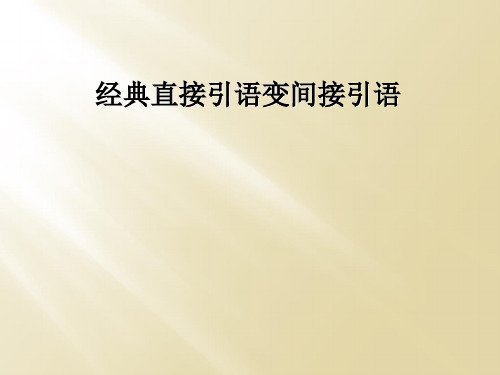
讲解注意点
直接引语变间接引语要注意以下 变化。
• 连接词 • 语序 • 时态 • 指代(人称、指示代词、时间状
语和地点状语)
注意连接词的变化
1.直接引语为陈述句,用that做连接词。 • He said, “Jim likes it very much.” • → He said that he liked it very much. 2.直接引语为一般疑问句,用if或wether做连接词。
you for a long time.” →Mr Smith said to his girl friend that he had not seen her for a long time.
直接引语改变为间接引语
2、直接引语如果是一般疑问句,变为间接引语时,需用从 属连接词whether或if引导,词序要改变。 Lily said to Miss Green, "Is it made in China?”
• →He asked his little sister not to cry any more.
What did Garfield say?
I’m lazy. He said he was lazy.
I’m hard-working sometimes. He said he was hard-working sometimes. I’m good at riding motorbikes. He said he was good at riding motorbikes. I’m better at dancing than singing.
He said he was better at dancing than singing.
- 1、下载文档前请自行甄别文档内容的完整性,平台不提供额外的编辑、内容补充、找答案等附加服务。
- 2、"仅部分预览"的文档,不可在线预览部分如存在完整性等问题,可反馈申请退款(可完整预览的文档不适用该条件!)。
- 3、如文档侵犯您的权益,请联系客服反馈,我们会尽快为您处理(人工客服工作时间:9:00-18:30)。
直接引语变间接引语(宾语从句)一.直接引语和间接引语的定义。
直接引语:直接引用别人的话叫直接引语,间接引语:用自己的话转述别人的话叫间接引语。
直接引语前后加引号;间接引语不必加引号。
He said, “ I’m a student.” (直接引语)→ He said that he was a student. (间接引语)主句从句主句从句二.当直接引语为特殊疑问句变间接引语形成宾语从句时,首先要注意用特殊疑问词,其后用陈述语序的句子,同时注意人称、时态、时间状语,连接词,语序的变化.(一)人称的变化规则:一随主,二随宾,第三人称不更新。
★(二).时态变化宾语从句时态变化规则:主现从不限;主过从四过(即4种过去的时态:一般过去时;过去进行时;过去将来时;过去完成时);客观真理,只用一般现在时。
1.主句一般现在时,从句可用任意时态。
2.主句过去时,从句用相应的过去时态。
即一般现在时改成一般过去时;现在进行时改成过去进行时;一般将来时改成过去将来时;一般过去时、现在完成时、过去完成时改成过去完成时。
3.主句过去时,从句是客观真理时,只用一般现在时。
Teacher told us:" The moon moves round the earth."Teacher told us the moon moves round the earth.(三)★(四).连接词1.从句为陈述句,常选择连接词that或将that省略,直接与主句相连。
2.从句为一般疑问句,常选择连接词if或whether。
3.从句为特殊疑问句,常选择what,when,where,which,who,how等的疑问代、副词作连接词。
注意:当who为主语时,句式为:who+谓语+其他注意:1. 语序不变的有:What’ the matter with you? What’s wrong with you?但What’s the trouble with you?的语序要变1)从句中有or / or not 。
例:she asks whether he stayed 。
2.只用whether 2)与不定式to do 连用。
例:I can’t decide whether to tell him the news3) 在介词后。
例:they are talking about whether they can afford the new house 用法是有区别的,但当if/whether同时出现在选项中的时候,我们要选whether★3.宾语从句语序:陈语述序,即:连接词+主语+谓语+其它。
或连接词(此时连接词充当主语)+谓语+其它。
陈述语序中:be动词、助动词、情态动词不能提到主语前。
例:1)can you tell me where is the hospital (错)can you tell me where the hospital is.(对)2)I don’t know whether does he speak Chinese (错)I don’t know whether he speaks Chinese (对)3)I am not sure what can he do (错)I am not sure what he can do (对)中考考点:时态、语序、连接词练习题一、填空,每空一词:1.“I am having supper,” he said.He said that ______ _______ having supper.2.“I’ve seen the film,” Gina said to me.Gina _______ me that she _______ _______ the film.3. “I went home with my sister,” she said.She said that _______ _______ _______ home with her sister.4.Th e teacher said, “The sun is bigger than the moon.”The teacher said that the sun _______ bigger than the moon.5.“I met her yesterday,” he said to me.He told me that he _______ met her the day _______.6. “You must come here before five,” he said.He said that I _______ to go _______ before five.7.“I bought the computer two weeks ago,” she said.She said that she _______ bought the computer two weeks _______.8. “Did you read the book last week?” he said.He _______ _______ I had read the book the week _______.9. He said, “You can sit here, Jim.”He _______ Jim that he _______ sit there10.He asked, “How did you find it, mother?”He asked her mother _______ _______ _______ found it.11. “Where have you been these days?” he asked.He asked me _______ _______ _______ been _______ days.12“Do you know where she lives?” he asked.He asked _______ _______ knew where she _______.13. “Keep quiet, children.” he said.He _______ the children _______ _______ quiet.14. “Don’t look out of the window,” she said.She told me _______ _______ _______ out of the window.15. “Are you interested in this?” he said.He _______ _______ I was interested in _______.二、选择:1. Our teacher asked us _____ our dictionaries to school.A. bringB. broughtC. bringD. to bring2. The teacher told the boy students ______ football on the grass.A. not playB. not to playC. playedD. playing3. ____ Tom didn’t go to school?A. Do you know howB. Why do you knowC. How you know whyD. Do you know why4. She looks sad. Could you please tell me _____ that prevents her from being as happy as before?A. what it isB. it is whatC. how it isD. it is how5. Betty asked her sister ____ to the railway station to see her off.A. not to comeB. not to goC. to not comeD. to not go6. The pupil asked his teacher _____ round the earth.A. weather the moon goesB. that the moon wentC. whether the moon goesD. whether the moon went7. Mr. Li ____ Wang Ling ____ a taxi to the airport.A. asked; takeB. asked; takingC. told; takeD. told; to take8. She asked him ____.A. whose dictionary this isB. whose dictionary that wasC. whose dictionary is thisD. whose dictionary that is9. Mary’s mother asked her _____.A. that whether she had finished her homeworkB. if she has finished her homeworkC. if she had finished her homeworkD. that if she had finished her homework10. Do you know ____?A. what is he doingB. what he doingC. what he is doingD. what does he do now11. I don’t know ____ to learn English.A. when did he beginB. when he beganC. he when beganD. when he begins12. He asked me ____.A. how would the weather be like tomorrowB. what the weather would be like the next dayC. how the weather would be like tomorrowD. what would the weather be like the next day13. You can’t imagine ____ when they rece ived these nice Spring Festival presents.A. how excited they wereB. how excited were theyC. how they were excitedD. they were how excited14. She told me that she ____ by her relatives at the bus stop.A. had been seen offB. have seen offC. have been seen offD. had seen off15. Do you remember how many times ____ to Australia?A. had you beenB. did you goC. have you beenD. you have been16.Can you guess ____?A. what is that manB. who that man isC. whom that man isD. who is that man17. More and more students and teachers have began to know ____.A. how important the foreign language areB. how the foreign language is importantC. how important the foreign language isD. how important is the foreign language18. The hostess said that it ___ time that they ___ supper.A. was; hadB. was; had hadC. is; haveD. is; have had19. The boss asked his secretary ____ he had finished typing the report ____.A. if; or notB. if; notC. whether; or notD. whether; not20. I wonder how much _____.A. does he spend on his carB. did he spend on his carC. he spent on his carD. he spent in his car答案一、填空1. he, was。
